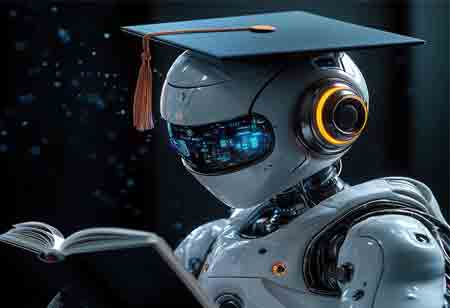THANK YOU FOR SUBSCRIBING
Be first to read the latest tech news, Industry Leader's Insights, and CIO interviews of medium and large enterprises exclusively from Education Technology Insights
The Future of Learning: AI's Role in Education
AI can revolutionize the educational sector by enabling personalized learning, promoting diversity, and maximizing results through data-driven insights.

By
Education Technology Insights | Tuesday, March 04, 2025
Stay ahead of the industry with exclusive feature stories on the top companies, expert insights and the latest news delivered straight to your inbox. Subscribe today.
AI can revolutionize the educational sector by enabling personalized learning, promoting diversity, and maximizing results through data-driven insights.
FREMONT, CA: Artificial intelligence (AI) is poised to revolutionize education by personalizing learning experiences, boosting educational outcomes, and preparing students for the future workforce. With increasing technology breakthroughs, AI provides an opportunity to create more engaging, effective, and accessible learning environments for students throughout the world. Despite the limitations, the transformative potential of artificial intelligence in education offers hope for a future in which every student can prosper and realize their full potential.
The potential of AI to personalize learning is one of its most significant effects on education. The one-size-fits-all philosophy of traditional education systems frequently means that pace and teaching strategies may only meet every student's demands. On the other hand, AI can customize educational content and delivery by analyzing massive quantities of data on student performance, learning preferences, and styles. AI-powered adaptive learning solutions can modify assignments in real time and offer more difficulties or help as needed to maximize each student's chances of success.
AI-powered tutoring systems offer personalized guidance and feedback comparable to human tutors. Natural Language Processing (NLP) algorithms enable these systems to interact with students in real time, answering questions, explaining concepts, and assessing comprehension. This enhances learning efficiency and allows teachers to focus more on mentoring and facilitating more profound learning experiences rather than routine tasks.
AI facilitates the creation of immersive learning environments through Virtual Reality (VR) and Augmented Reality (AR). These technologies simulate real-world scenarios, allowing students to explore complex concepts in science, history, and other subjects firsthand. VR and AR applications powered by AI can adapt to student interactions, providing customized simulations that engage and motivate learners, fostering a deeper understanding of abstract concepts.
AI-driven data analytics in education offer valuable insights into student performance trends and learning patterns. Educators can use predictive analytics to identify at-risk students early, intervene with targeted support, and optimize teaching strategies based on evidence-backed insights. By harnessing big data, AI enables schools and educational institutions to make informed decisions that enhance educational effectiveness and resource allocation.
AI is also essential for solving accessibility issues in education. Speech recognition technology allows disabled students to engage more thoroughly in classroom activities, and AI-powered translation tools help pupils learn languages and understand different cultures. These developments ensure that all students, regardless of their background or ability, have fair access to high-quality education by promoting inclusivity and diversity in educational settings.
Integrating AI in education presents difficulties and moral issues. To guarantee ethical deployment and utilization, privacy problems about student data, algorithmic bias, and the fair distribution of AI-driven resources must be addressed. Teachers and legislators are essential in creating clear policies and moral standards that protect students' rights and encourage creativity in the classroom.
As technology advances, artificial intelligence's impact on integrating AI in education presentations will only improve education and prepare students for the digital economy, which will require collaborations between researchers, educators, and tech developers. As AI becomes increasingly integrated into educational practices, teachers must adapt their strategies and techniques to take full advantage of these tools and assist students in acquiring the digital literacy, critical thinking, and problem-solving abilities necessary for success in the twenty-first century.







